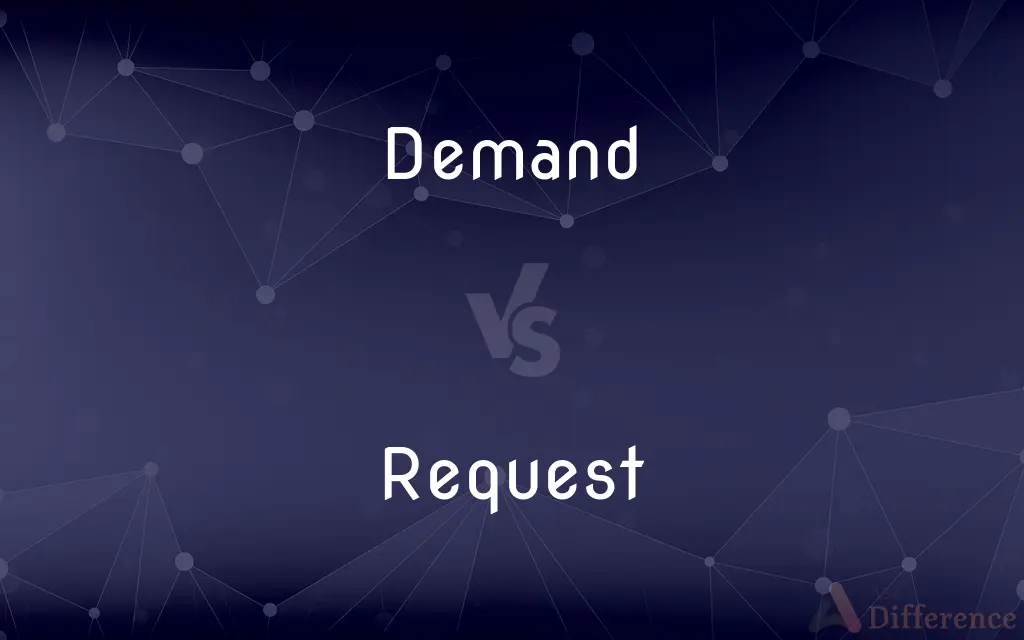Demand vs. Request — What's the Difference?
By Maham Liaqat & Urooj Arif — Updated on March 26, 2024
Demand involves insisting on something due to authority or need, focusing on a strong expectation, while a request is a polite or formal plea, emphasizing courtesy and choice.

Difference Between Demand and Request
Table of Contents
ADVERTISEMENT
Key Differences
Demand conveys a stronger sense of urgency and necessity, often implying that the person making the demand has some authority or right to expect compliance. It's associated with a position of power or a situation where the outcome is somewhat non-negotiable. Whereas a request is framed as a question or plea, suggesting that the outcome is not assured and the response could be positive or negative, based on the decision of the person asked.
In the context of communication, a demand is more likely to be direct and possibly blunt, reflecting an expectation of immediate action or response. It carries a tone of insistence and sometimes, an implication of consequences for non-compliance. On the other hand, a request typically employs polite language and may include words that soften the ask, such as "please" or "could you," indicating respect for the recipient's autonomy.
Demands are often used in situations where there's a clear hierarchy or authority structure, such as between an employer and employee or in legal contexts. They reflect a power dynamic where the person making the demand has the upper hand. Requests, however, are common in everyday interactions among equals or when someone with less authority is seeking assistance or permission from someone with more power.
While demands might be seen in situations of urgency or critical need, highlighting an imperative need for action, requests suggest a desire for cooperation and are often used when there's flexibility in terms of how or when something is accomplished. This distinction affects how each is perceived; demands can sometimes be seen as aggressive or commanding, whereas requests are typically viewed as polite and considerate.
Demands can also carry legal implications, especially when used in formal settings like courts or contractual agreements, indicating a compulsory action based on rights or laws. In contrast, requests in such contexts are understood as appeals for action that are not legally binding, emphasizing the voluntary nature of compliance.
ADVERTISEMENT
Comparison Chart
Tone
Insistent, authoritative
Polite, deferential
Expectation
High, with an assumption of compliance
Hopeful, without presumption of acquiescence
Authority
Often implies a position of power or right
Implies equality or lower status
Communication
Direct, possibly blunt
Courteous, often includes softening language
Context
Legal, hierarchical, urgent situations
Everyday interactions, formalities, favors
Compare with Definitions
Demand
A firm request for something due to authority or right.
The manager's demand for overtime work was met with mixed reactions.
Request
Asking for permission or a favor.
His request to join the team was approved.
Demand
Insistence on compliance or action.
The protesters' demands were clear and non-negotiable.
Request
A polite or formal plea for something.
She made a request for a day off.
Demand
An economic term describing consumer desire and willingness to pay.
High demand for the new product led to a sold-out launch.
Request
Seeking a service or action.
They put in a service request for computer repairs.
Demand
A legal claim or entitlement.
The creditor issued a demand for payment.
Request
A formal application or submission.
The grant application requires a written request.
Demand
A condition of urgent need.
The demand for water in the drought-stricken area was critical.
Request
An appeal for assistance or information.
The email contained a request for feedback.
Demand
In economics, demand is the quantity of a good that consumers are willing and able to purchase at various prices during a given period of time. The relationship between price and quantity demanded is also called the demand curve.
Request
An act of asking politely or formally for something
A request for information
The club's excursion was postponed at the request of some of the members
Demand
An insistent and peremptory request, made as of right
A series of demands for far-reaching reforms
Request
Politely or formally ask for
The chairman requested that the reports be considered
He received the information he had requested
Demand
Ask authoritatively or brusquely
‘Where is she?’ he demanded
The police demanded that he give them the names
Request
To express a desire for, especially politely; ask for. Often used with an infinitive or clause
Requested information about the experiment.
Requested to see the evidence firsthand.
Requested that the bus driver stop at the next corner.
Demand
To ask for urgently or peremptorily
Demand an investigation into the murder.
Demanding that he leave immediately.
Demanded to speak to the manager.
Request
To ask (a person) to do something
The police requested her to accompany them.
Demand
To claim as just or due
Demand repayment of a loan.
Request
An act of asking for something.
Demand
To ask to be informed of
Demanded an explanation for the interruption.
Request
Something asked for
Wasn't happy until he got his request.
Demand
To require as useful, just, proper, or necessary; call for
A gem that demands a fine setting.
Request
To ask for (something).
The corporal requested reinforcements.
I have requested that the furniture be moved back to its original position.
Demand
To lay legal claim to; claim formally.
Request
(transitive) To ask (somebody) to do something.
She called me into her office and requested me to sit down.
Demand
To ask that (something) be done in accordance with a legal requirement.
Request
Act of requesting (with the adposition at in the presence of possessives, and on in their absence).
Demand
To make a demand.
Request
A formal message requesting something.
Demand
An act of demanding; an urgent request.
Request
Condition of being sought after.
Demand
Something demanded
On strike until they get their demands.
Request
(networking) A message sent over a network to a server.
The server returned a 404 error to the HTTP request.
Demand
An urgent requirement or need
The heavy demands of her job.
The emotional demands of his marriage.
An increased oxygen demand.
Request
(obsolete) That which is asked for or requested.
Demand
The state of being sought after
In great demand as a speaker.
Request
The act of asking for anything desired; expression of desire or demand; solicitation; prayer; petition; entreaty.
I will marry her, sir, at your request.
Demand
(Economics) The desire for goods or services in an economy, measured as the amount people are ready to buy at a given price
Supply should rise to meet demand.
Request
That which is asked for or requested.
I will both hear and grant you your requests.
Demand
A formal claim.
Request
A state of being desired or held in such estimation as to be sought after or asked for; demand.
Knowledge and fame were in as great request as wealth among us now.
Demand
A request that some act be done or payment made in accordance with a legal requirement.
Request
To ask for (something); to express desire ffor; to solicit; as, to request his presence, or a favor.
Demand
(Archaic) An emphatic question or inquiry.
Request
To address with a request; to ask.
I request youTo give my poor host freedom.
Demand
The desire to purchase goods and services.
Prices usually go up when demand exceeds supply.
Request
A formal message requesting something that is submitted to an authority
Demand
(economics) The amount of a good or service that consumers are willing to buy at a particular price.
Request
The verbal act of requesting
Demand
A forceful claim for something.
Modern society is responding to women's demands for equality.
Request
Express the need or desire for; ask for;
She requested an extra bed in her room
She called for room service
Demand
A requirement.
His job makes many demands on his time.
There is a demand for voluntary health workers in the poorer parts of Africa and Asia.
Request
Ask (a person) to do something;
She asked him to be here at noon
I requested that she type the entire manuscript
Demand
An urgent request.
She couldn't ignore the newborn baby's demands for attention.
Request
Inquire for (information);
I requested information from the secretary
Demand
An order.
Demand
(electricity supply) More precisely peak demand or peak load, a measure of the maximum power load of a utility's customer over a short period of time; the power load integrated over a specified time interval.
Demand
To request forcefully.
I demand to see the manager.
Demand
To claim a right to something.
The bank is demanding the mortgage payment.
Demand
To ask forcefully for information.
I demand an immediate explanation.
Demand
To require of someone.
This job demands a lot of patience.
Demand
(legal) To issue a summons to court.
Demand
To ask or call for with authority; to claim or seek from, as by authority or right; to claim, as something due; to call for urgently or peremptorily; as, to demand a debt; to demand obedience.
This, in our foresaid holy father's name,Pope Innocent, I do demand of thee.
Demand
To inquire authoritatively or earnestly; to ask, esp. in a peremptory manner; to question.
I did demand what news from Shrewsbury.
Demand
To require as necessary or useful; to be in urgent need of; hence, to call for; as, the case demands care.
Demand
To call into court; to summon.
Demand
To make a demand; to inquire.
The soldiers likewise demanded of him, saying, And what shall we do?
Demand
The act of demanding; an asking with authority; a peremptory urging of a claim; a claiming or challenging as due; requisition; as, the demand of a creditor; a note payable on demand.
The demand [is] by the word of the holy ones.
He that has confidence to turn his wishes into demands will be but a little way from thinking he ought to obtain them.
Demand
Earnest inquiry; question; query.
Demand
A diligent seeking or search; manifested want; desire to possess; request; as, a demand for certain goods; a person's company is in great demand.
In 1678 came forth a second edition [Pilgrim's Progress] with additions; and then the demand became immense.
Demand
That which one demands or has a right to demand; thing claimed as due; claim; as, demands on an estate.
Demand
The asking or seeking for what is due or claimed as due.
Demand
The ability and desire to purchase goods and services;
The automobile reduced the demand for buggywhips
The demand exceeded the supply
Demand
An urgent or peremptory request;
His demands for attention were unceasing
Demand
A condition requiring relief;
She satisfied his need for affection
God has no need of men to accomplish His work
There is a demand for jobs
Demand
The act of demanding;
The kidnapper's exorbitant demands for money
Demand
Required activity;
The requirements of his work affected his health
There were many demands on his time
Demand
Request urgently and forcefully;
The victim's family is demanding compensation
The boss demanded that he be fired immediately
She demanded to see the manager
Demand
Require as useful, just, or proper;
It takes nerve to do what she did
Success usually requires hard work
This job asks a lot of patience and skill
This position demands a lot of personal sacrifice
This dinner calls for a spectacular dessert
This intervention does not postulates a patient's consent
Demand
Claim as due or just;
The bank demanded payment of the loan
Demand
Lay legal claim to
Demand
Summon to court
Demand
Ask to be informed of;
I demand an explanation
Common Curiosities
How can one soften a demand to sound more like a request?
Incorporating polite language, such as "please" or "could you," and framing the demand as a question can soften it to sound more like a request.
Can a request be ignored?
Yes, a request can be ignored, as it typically does not carry the same expectation of compliance as a demand.
Can a request turn into a demand?
Yes, if a polite request is not met, the person asking may escalate the situation by making a demand, especially if they have the authority to do so.
Why are requests often preferred in social interactions?
Requests are preferred because they respect the autonomy of the other party and foster a cooperative atmosphere.
Are demands always negative?
Not necessarily. Demands can be perceived negatively if they're seen as too aggressive, but in certain contexts, such as legal or emergency situations, they are necessary and expected.
Is it okay to refuse a demand?
Depending on the context and the consequences of non-compliance, it may be okay to refuse a demand, especially if it's unreasonable or beyond one's capacity.
How should one respond to a demand?
Responses to demands should consider the authority and urgency of the demand. Compliance may be necessary if the demand comes from a position of authority or legal requirement.
Can a demand be made politely?
Yes, demands can be phrased politely, especially in professional settings, to maintain a respectful tone while still conveying urgency or authority.
What makes a request effective?
Clarity, politeness, and understanding the receiver's perspective make a request more likely to be granted.
Is it more effective to make a demand or a request?
It depends on the context and the relationship between the parties involved. Requests are generally more effective in cooperative environments, while demands may be necessary in hierarchical or urgent contexts.
Can technology change how demands and requests are perceived?
Technology, especially digital communication, can affect the tone and interpretation of demands and requests, sometimes making it harder to convey politeness or urgency effectively.
In what situations should a demand be used over a request?
Demands are more appropriate in situations where compliance is necessary, such as in emergency responses, legal matters, or when authority needs to be asserted.
Are there legal differences between a demand and a request?
Yes, in legal contexts, a demand often implies a right or entitlement, while a request is more of an appeal without legal force.
How do cultural differences affect perceptions of demands and requests?
Cultural norms significantly influence how demands and requests are perceived and delivered; what's considered polite or acceptable in one culture may be seen differently in another.
How do demands affect relationships?
Overuse of demands can strain relationships, especially if perceived as overbearing or unreasonable. Balancing demands with respectful communication is key.
Share Your Discovery

Previous Comparison
Embody vs. Imbody
Next Comparison
Thereof vs. WhereofAuthor Spotlight
Written by
Maham LiaqatCo-written by
Urooj ArifUrooj is a skilled content writer at Ask Difference, known for her exceptional ability to simplify complex topics into engaging and informative content. With a passion for research and a flair for clear, concise writing, she consistently delivers articles that resonate with our diverse audience.














































